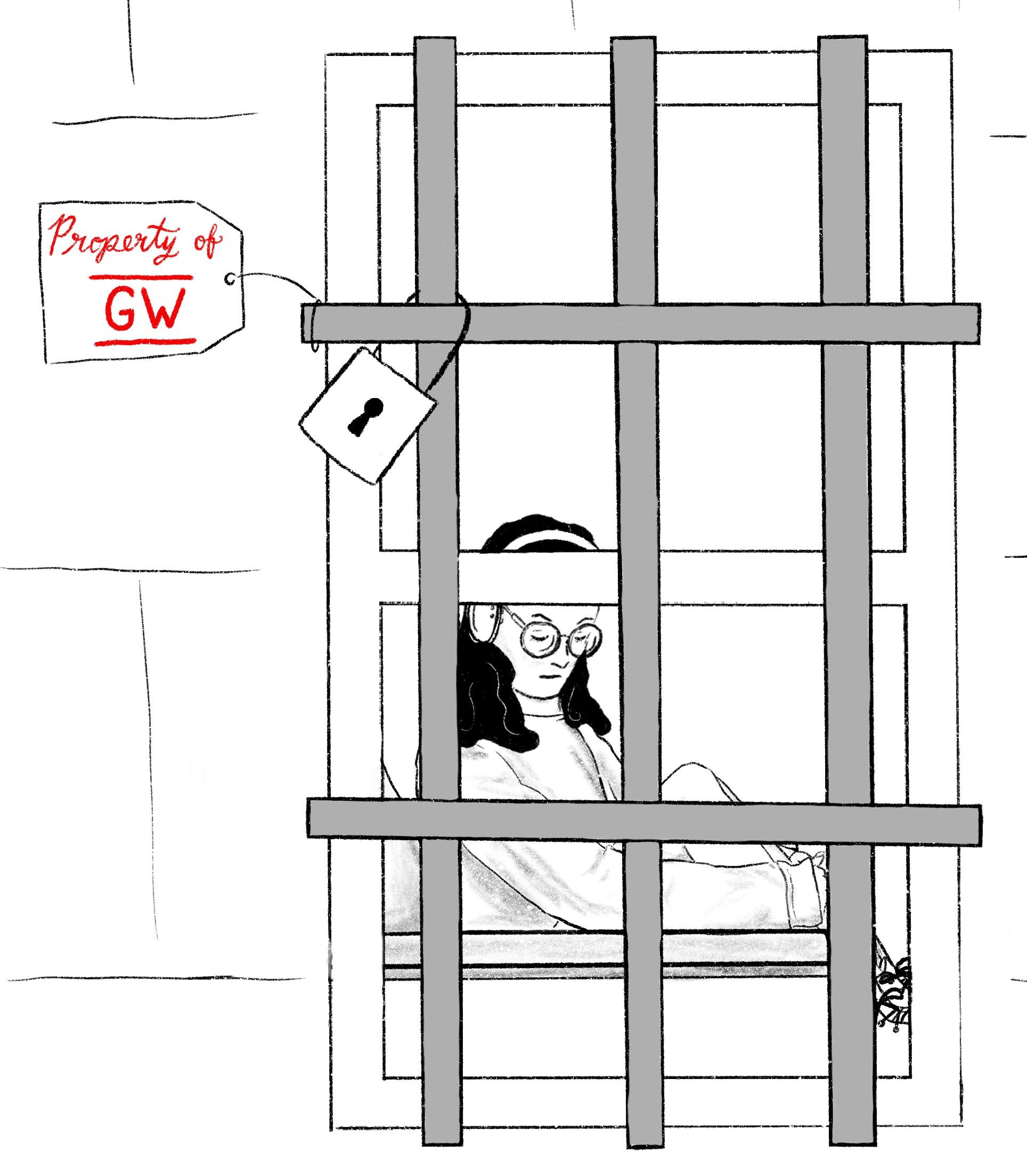From studio apartments in Dupont Circle to townhouses in Columbia Heights, students have plenty of options to find off-campus housing in the District – so long as they’ve done their time on campus. Between D.C. law and GW’s own policies, freshmen, sophomores and juniors must live in residence halls unless they meet six specific criteria, ranging from their marital status to their religious beliefs, that will garner exemptions from GW.
But neither students nor officials are above bending the University’s rules to transfer campus residents to off-campus housing. GW’s irregularly enforced housing requirement isn’t fostering community in Foggy Bottom. Caught in between deceptions and exemptions, it’s hardly a rule at all.
D.C. law requires the University to house all freshmen and sophomores on campus except those who are permanent residents, veterans, married, disabled or whose religious beliefs can’t be accommodated within an on-campus residence hall. That changed when GW instituted a three-year residency requirement in 2014 to “further support students’ academic and campus experiences” and assuage residents’ concerns over their noisy and disrespectful Foggy Bottom neighbors.
GW’s three-year residency requirement comes with exemptions of its own, as juniors can submit requests for an exemption to Campus Living and Residential Education on a first-come, first-served basis. But that policy has also changed, and largely because of the COVID-19 pandemic. The University’s decision to tightly regulate on-campus housing for the 2020-21 academic year meant that there were 1,500 undergraduate students living on campus compared to about 2,300 undergraduates living off campus in spring 2021. Even as officials planned to reopen campus during the last academic year, they granted exemptions to rising sophomores and juniors with long-term leases.
But after students came flocking back to campus, GW appeared to be short on housing. To clear a waitlist of about 250 students for this school year, officials waived the three-year requirement and offered to reduce students’ price of housing by thousands of dollars if they accepted another roommate. But if the requirement was such a cornerstone of the University’s academic and campus culture, then why would officials waive it so often in the first place?
Granted, campus housing can be genuinely convenient and comfortable for many students, and living in a residence hall under the supervision of a community coordinator can give freshmen and sophomores a gentle introduction to adulting and making friends in college. But on- and off-campus housing is a balancing act – it’s in GW’s financial interest to charge as many students as possible for room and board, but the reality is that there are only so many empty beds on campus at any given time.
Even as GW has shown it’s willing to waive the three-year housing requirement, students have broken the rules entirely. To circumvent the residency requirement, freshmen and sophomores have submitted false addresses, lied about their faith and doctored utility bills. That determination flies in the face of the Code of Student Conduct, but it should be a wake-up call for officials – in the scramble to house students, all parties are ignoring the third-year requirement.

Maura Kelly-Yuoh | Staff Cartoonist
With or without the University’s approval, students are going to seek alternatives to the University’s motley collection of residence halls. At one popular off-campus housing option, the Varsity on K directly advertises to students who can’t wait to move out of GW’s residence halls – “Sure, the dorms are close, unless they exile you to the Vern,” the building’s website reads. Off-campus apartments can offer more space and better amenities at a lower cost than residence halls, and some like The Avenue and The President next to the I Street Whole Foods, are closer to the heart of GW’s Foggy Bottom Campus than buildings along the outskirts, like 1959 E Street.
Eight years after its implementation, the housing requirement is a paradox – its exemptions are crucial to the University’s operation and students’ comfort, but they call the requirement’s very purpose into question. What’s ostensibly a hard and fast rule simply isn’t, shifting with GW’s available housing stock before the start of the academic year.
The three-year housing requirement is long overdue for a reassessment and perhaps a replacement that GW, students and our Foggy Bottom neighbors can agree upon. The selectively enforced requirement simply isn’t working. It’s no guarantee against students’ bad behavior in the neighborhood. It arbitrarily restricts or permits them from looking for off-campus housing. And it forces the University to search for more space to house students on campus.
We can only speculate as to what a return to the pre-2014, two-year residency requirement might look like, but it may mean consolidating smaller residence halls in favor of larger buildings like District House and Thurston Hall or offering more amenities to entice students to stay on campus.
Ending the three-year requirement would nearly certainly represent a financial loss for the University, which must account for annual room and board costs in addition to “megadorm” renovation projects, like those at District House and Thurston Hall. But we feel GW serves us best as an institution of higher learning, not a landlord – we know our housing needs and financial limits better than Campus Living and Residential Education. And if extracting room and board from students is truly key to GW’s financial solvency, officials have a bigger problem than who can live off campus.
Students can make GW their home, but they don’t need to live there to do so.
The editorial board consists of Hatchet staff members and operates separately from the newsroom. This week’s staff editorial was written by Opinions Editor Ethan Benn and Contributing Opinions Editor Riley Goodfellow, based on discussions with Research Assistant Zachary Bestwick, Sports Editor Nuria Diaz, Copy Editor Jaden DiMauro, Culture Editor Clara Duhon and Contributing Social Media Director Ethan Valliath.

